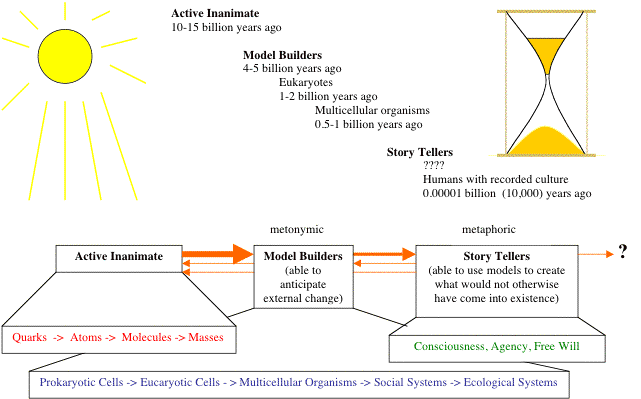
Hence, the key question when one first hears a story should not be, is it wrong? That it will eventually be shown to be is a given. The first question should always be "is it useful? does it take one in new and potentially productive directions?" Once one has figured out the usefulness of a story, THEN one goes on the its limitations (its inevitable "wrongness") in search of the next story (theory). See Being, Thinking, Story Telling: What It Is and How It Works, Reflectively
"Emergence" may, in the abstract, never have a completely explanatory theory (and can't, in fact, if, as we collectively tend to believe, it is constantly generating new and unpredictable observations). On the other hand, aspects of emergence do in fact yield useful theories/stories, as we've been productively engaged in finding out.
It is useful to distinguish within "emergence" several different, interdependent levels of phenomena
And to distinguish between two forms of "entities", those that are not and those that are affected in their internal organization by their actions and the actions of other agents. The latter are "model-bulders", ie their internal organization is reflective of history and able to anticipate change.
And to distinguish between two kinds of "top down" interactions: those reflecting "stigmergy" in which the top-down influence is simply the accumulated resultant of agent actions and those reflecting "agency" in which the top-down influence is itself an autonomous and purposeful agent. "Story-tellers" fall into the latter group.
My case study for trying to understand emergence: the history of the universe

Over very long periods of time under the influence of the second law of thermodynamics as a driving force there is increasing "complexity" with some distinguishable "steps". The proposition is that by trying to understand these phenomena in this test case we can come to (actually, create?) some broader understandings of the meaning and underlying processes of emergence.
Today's task is to fill in some spaces and attempt to answer a question:
The active inanimate (fundamental "irreversibility" and "indeterminacy"
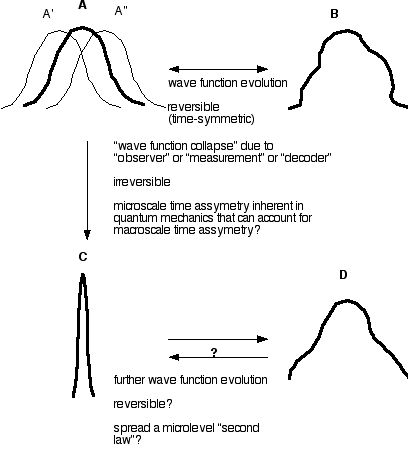
 From this perspective, it is not difficulties in recovering the past or predicting the future that need to be accounted for. What needs to be accounted for instead is the existence of ANY ability to predict the future and/or recover the past.
From this perspective, it is not difficulties in recovering the past or predicting the future that need to be accounted for. What needs to be accounted for instead is the existence of ANY ability to predict the future and/or recover the past.
 Model builders (the nature of evolution)
Model builders (the nature of evolution)

Story tellers (the "bipartite brain", a new architecture)
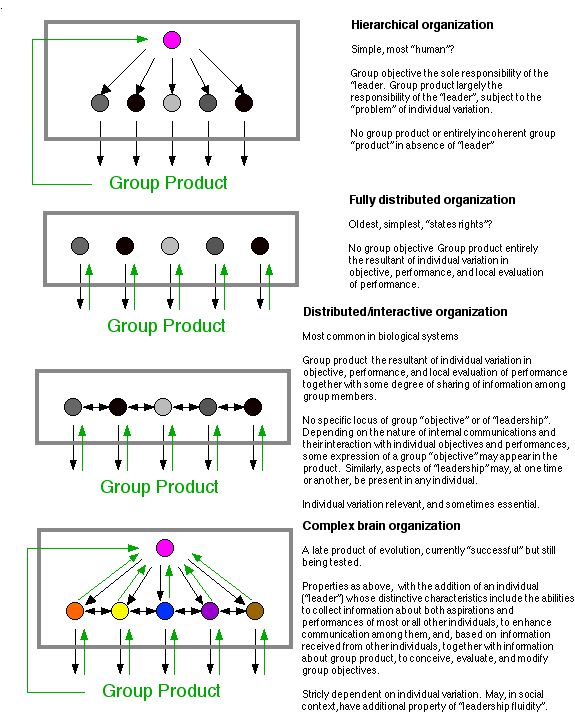
More on the story teller and its relation to "culture"
More on story-telling
The receiver re-expands the utterance, again with some indeterminacy
Humans can influence each other's stories but only by creating their own stories and inferring similarities and differences with the stories of others
Utterances are a way of probing stories and their underpinnings, and a way of generating new things/exploring
Bottom line:
We are all active and interacting entities in a long-standing exploration of possible forms of material organization which has been enriched by story-telling and agency ...
There is no end to the process
And so no way to know for sure at any given time whether a particular emergence is "epistemological" or "ontological", a distinction that exists and is of interest only for story-tellers of a particular inclination.
The only way to find approximate the "ontological" is to repeatedly challenge the "epistemological", no "view from nowhere" achievable, there is only the continual expanding of the "view from everywhere"
And in the context of the observations made to date ... Paul Grobstein, 25 October
See Forum
Interesting issue, the causation of "wave function collapse ... because of physicist's descriptions ("measure", "observation") one gets the impression this depends on/results from "human observer") ... is it possible that universe, before humans, was actually in a "quantum" state? Does it matter, for my story? Arguments against the idea
Because of emergence, there is no "naive reductionism", ie very few properties of systems can be explained by discovering underlying single elements that mirror them
Middlesex p 387 ... "from inside there is no comparison" ... contrast to "can't get outside of myself"
There is an "unconscious" iff there is a conscious? But NOT because the conscious stocks it ...
Add handling of probability to list of conscious/unconscious differences
Issue of absolute indeterminacy is actually an issue of whether one can or cannot achieve the "view from nowhere" OR the "view from everywhere". "Complete knowledge" is ... oxymoronic (chen?) ... knowledge is always "situated" ... "lack of knowledge" is no more than the possibility of gaining a new perspective in the future ... which is non-eliminable ... relevant re information? ... re non-reality of past?
[an error occurred while processing this directive]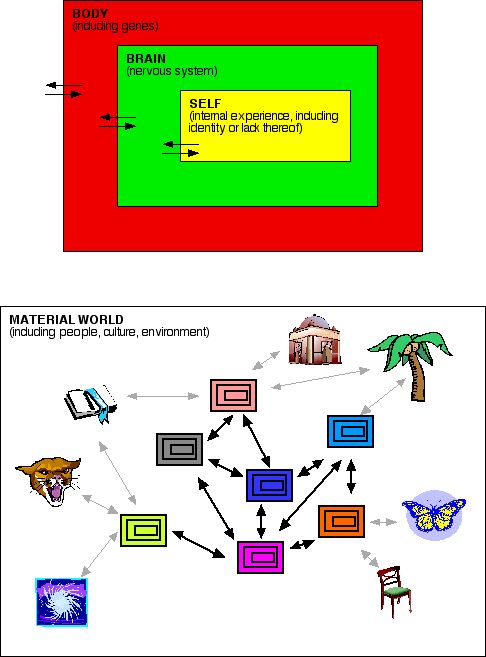
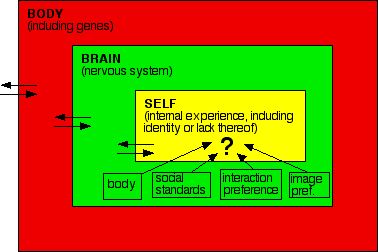


 An utterance (signal) is a particular realization of a larger potential, an irreversible compression (neither fully predictable nor fully explainable) and meaningless without a receiver
An utterance (signal) is a particular realization of a larger potential, an irreversible compression (neither fully predictable nor fully explainable) and meaningless without a receiver
 Significance of an "invariant" across lots of different phenomena/scales?
Significance of an "invariant" across lots of different phenomena/scales?
Relation of this invariant to heat engine, Maxwell's demon?
More on where ANY ability to predict the future/recover the past comes from?
Post talk notes - 28 October